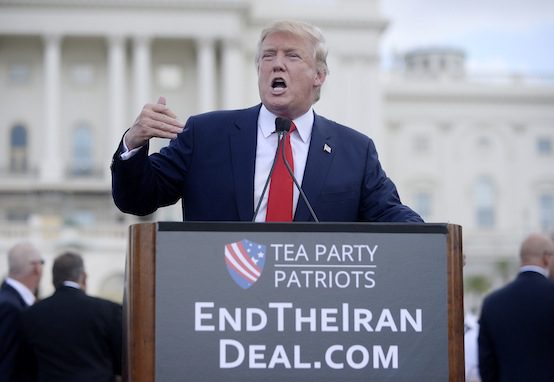Trump’s Failed and Costly Iran Policy

Ross Douthat doesn’t think much of Trump’s Iran policy, but mostly just faults it for going too far:
Which brings us back to the question of whether the larger context in which tensions are rising, the broad “maximum pressure” approach by the U.S., makes clear strategic sense.
I think that it does not. The United States can treat Iran as an enemy without going all in for brinksmanship; it can leave the nuclear deal without taking steps that make a conventional war more immediately likely.
It’s not clear what purpose would be served by treating Iran as an enemy or leaving the nuclear deal unless one wanted to implement a hard-line confrontational policy against Iran. Since Iran hawks typically hated the nuclear deal because it deprived them of a pretext for conflict, it isn’t an accident that abandoning the agreement has led to a series of increasingly aggressive moves that have made war more likely. The only other states in the world that wanted the U.S. to leave the nuclear deal are also the ones that want the U.S. to court conflict with Iran. They wanted Trump to renege on the deal in order to take steps that make war more likely, so by reneging on the deal and reimposing sanctions Trump gave Iran hawks and our reckless regional clients an opportunity to do just that. I agree that “maximum pressure” doesn’t make strategic sense, but then neither does the decision to give up on a successful nonproliferation agreement when all other parties are honoring their commitments. It is a strange thing to suggest that the U.S. should tear up the product of successful diplomacy that resolved a major dispute, but that doing this won’t make war more likely.
A president who wanted to extricate the U.S. from the Middle East wouldn’t be obsessed with regarding Iran as the source of all regional problems, but then this obsession has defined how Trump has conducted foreign policy in the region even before he withdrew from the JCPOA. Ever since he was a candidate, Trump has made a point of taking a very hawkish anti-Iranian position. It has been one of the few consistent positions he took and kept over the last four years. The destructive administration Iran policy we have today is what we were bound to get from someone who explicitly campaigned as a fervent Iran hawk in 2015 and 2016. Trump can’t “return” to “campaign-season wisdom” that he never had. He certainly won’t be doing that when he is still surrounded by hard-liners that have been seeking conflict and regime change for years.
Part of the anti-Iranian positioning was to distinguish himself from Obama, who was supposedly insufficiently “pro-Israel” and “pro-Saudi” for many in the foreign policy establishment, but most of it was to show favor to the regional clients that want the U.S. to fight Iran for them. Trump has never been committed to “maintaining a Middle Eastern status quo,” because from the beginning of his presidency he made it clear that he was going to indulge and back Israel, Saudi Arabia, and the UAE in anything they wanted. In practical terms, this has meant giving one gift after another to Israeli hard-liners while aiding and abetting the Saudis and Emiratis in slaughtering Yemeni civilians and fighting Congress every time they try to end U.S. involvement in that horror show. It has also meant making excuses and providing cover for the numerous and growing abuses of the Saudi crown prince. This has been a massive overreaction to Obama’s extremely limited thaw in relations with Iran, and as a result the current administration is more subservient to these client governments than any of its recent predecessors. That is very bad for U.S. interests even if it doesn’t lead to a war with Iran, because it means that the U.S. will continue to enable and be implicated in our clients’ war crimes in Yemen and elsewhere. We can’t make sense of Trump’s relentless hostility to Iran and its people unless we remember to take his extreme bias in favor of these regional clients into account.
In late 2017, Douthat argued that Trump was presiding over a “moderately successful” foreign policy in the Middle East. Douthat even said that Trump had “slow-walked his hawkish instincts on Iran” when he had already refused to certify the nuclear deal. That was all wrong then, and it’s still wrong today. As for Trump’s Iran policy, it is a failed and costly one that has failed because Trump did almost everything that Iran hawks had been demanding from the U.S. government for years. There is no larger strategy. Trump is simply Trump catering to hard-liners in his party and U.S. clients in the region without any regard for the consequences, and it has brought the U.S. unacceptably close to a disastrous conflict just as critics of the administration’s Iran policy have been warning for the last two years.
Comments